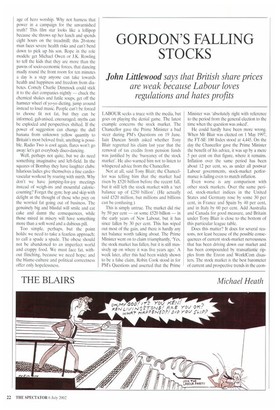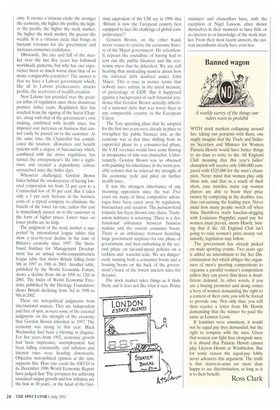GORDON'S FALLING STOCKS
John Littlewood says that British share prices
are weak because Labour loves regulations and hates profits
age of hero worship. Why not harness that power in a campaign for the unvarnished truth? This film star looks like a lollipop because she throws up her lunch and spends eight hours on the treadmill; this 20-stone man faces severe health risks and can't bend down to pick up his son. Rope in the role models: get Michael Owen or J.K. Rowling to tell the kids that they are more than the pawns of socio-economic forces, that dancing madly round the front room for ten minutes a day is a step anyone can take towards health and happiness and freedom from diabetes. Comely Charlie Dimmock could stick it to the diet companies nightly — chuck the chemical shakes and futile soups, get off the hamster wheel of yo-yo dieting, jump around instead to loud music. People can't be forced to choose fit not fat, but they can be informed. galvanised, encouraged; myths can be exploded and perspectives shifted. If the power of suggestion can change the dull banana from unknown yellow quantity to Britain's most beloved fruit, anything is possible. Radio Two is cool again, flares won't go away: let's get everybody disco-dancing.
Well, perhaps not quite, but we do need something imaginative and left-field. In the squares of Bombay they have laughter clubs: hilarious ladies give themselves a fine cardiovascular workout by roaring with mirth. Why don't we have jumping-for-joy meetings instead of weigh-ins and mournful caloriecounting? Forget the gym; hop and skip with delight at the thought of those who prey on the worried fat going out of business. The genuinely big and blissful will smile and eat cake and damn the consequences, while those mired in misery will have something more than a soft word and a dubious pill.
Too simple, perhaps, but the point holds: we need to take a fearless approach; to call a spade a spade. The obese should not be abandoned to an imperfect world and crappy food. We must face fat, without flinching, because we need hope; and the blame-culture and political correctness offer only hopelessness. LABOUR seeks a truce with the media, but goes on playing the denial game. The latest example concerns the stock market. The Chancellor gave the Prime Minister a bad steer during PM's Questions on 19 June. lain Duncan Smith asked whether Tony Blair regretted his claim last year that the removal of tax credits from pension funds was justified by the 'buoyancy of the stock market'. He also warned him not to listen to whispered advice from the Chancellor.
Not at all, said Tony Blair; the Chancellor was telling him that the market had risen by £520 billion before the recent fall, but it still left the stock market with a 'net balance up of £250 billion'. (He actually said £520 million, but millions and billions can be confusing.) This is simply untrue. The market did rise by 50 per cent — or some £520 billion — in the early years of New Labour, but it has since fallen by 30 per cent. This has wiped Out most of the gain, and there is hardly any net balance worth talking about. The Prime Minister went on to claim triumphantly, 'Yes, the stock market has fallen, but it is still massively up on where it was five years ago.' A week later, after this had been widely shown to be a false claim, Robin Cook stood in for PM's Questions and asserted that the Prime Minister was 'absolutely right with reference to the period from the general election to the time when the question was asked'.
He could hardly have been more wrong. When Mr Blair was elected on 1 May 1997, the FT-SE 100 Index stood at 4,445. On the day the Chancellor gave the Prime Minister the benefit of his advice, it was up by a mere 5 per cent on that figure, where it remains. Inflation over the same period has been about 12 per cent, so, as under all postwar Labour governments, stock-market performance is failing even to match inflation.
Even worse is any comparison with other stock markets, Over the same period, stock-market indices in the United States and Germany rose by some 30 per cent, in France and Spain by 40 per cent, and in Italy by 60 per cent. Add Australia and Canada for good measure, and Britain under Tony Blair is close to the bottom of this particular league table.
Does this matter? It does for several reasons, not least because of the possible consequences of current stock-market nervousness that has been driving down our market and has been compounded by transatlantic ripples from the Enron and WorldCom disasters. The stock market is the best barometer of current and prospective trends in the coon
omy. It creates a virtuous circle: the stronger the economy, the higher the profits; the higher the profits, the higher the stock market; the higher the stock market, the greater the wealth. It is a virtuous circle that brings in buoyant revenues for the government and increases consumer confidence.
Obviously, the rise and fall of the market over the last five years has followed worldwide patterns, but why has our experience been so much worse than that of so many comparable countries? The answer is that we have a Labour government which, like all its Labour predecessors, attacks profits, the seed-corn of wealth creation.
New Labour has presided over the greatest influx of regulation since those disastrous postwar Attlee years. Regulation that has resulted from the signing of the Social Chapter, along with that of the government's own making, combined with stealth taxes, has imposed cost increases on business that cannot easily be passed on to the customer. At the same time, the Chancellor has complicated the taxation, allowances and benefit systems with a degree of bureaucracy which, combined with the above regulation, has turned the entrepreneur's life into a nightmare and created a dependency culture unmatched since the Attlee days.
Whenever challenged, Gordon Brown hides behind the smokescreen of having lowered corporation tax from 33 per cent to a Continental low of 30 per cent. But it takes only a 1 per cent increase in the business costs of a typical company to eliminate the benefit of the lower tax rate, unless this cost is immediately passed on to the customer in the form of higher prices. Lower taxes on lower profits are no help.
The judgment of the stock market is supported by international league tables that show a year-by-year decline in the state of Britain's economy since 1997. The Swissbased Institute for Management Development has an annual world-competitiveness league table that shows Britain falling from 9th in 1997 to 19th in 2001. Another table, published by the World Economic Forum, shows a decline from 4th in 1998 to 12th in 2001. The Index of World Economic Freedom, published by the Heritage Foundation, shows Britain declining from 3rd in 1998 to 9th in 2002.
These are non-political judgments from international sources. They are independent and free of spin, as were some of the external judgments on the strength of the economy that Gordon Brown inherited in 1997. The economy was strong in that year. Black Wednesday had been a blessing in disguise. For five years from 1992, economic growth had been impressive, unemployment had been falling consistently, and inflation and interest rates were heading downwards. Objective non-political opinion at the time supports this. How else could the OECD in its December 1996 World Economic Report have judged that 'The prospects for achieving sustained output growth and low inflation are the best in 30 years', or the head of the Ger
man equivalent of the CBI say in 1996 that 'Britain is now the European country best equipped to face the challenge of global competitiveness'?
Gordon Brown, on the other hand, never ceases to rewrite the economic history of the Major government. He relentlessly repeats the soundbite of having had to sort out the public finances and the economic mess that he inherited. We are still hearing that misleading mantra about how the national debt doubled under John Major. This is true in money terms that nobody uses; untrue in the usual measure of percentage of GDP. But it happened against a background of such financial prudence that Gordon Brown actually inherited a national debt that was lower than in any comparable country in the European Union.
The Tory spending plans that he adopted for the first two years were already in place to strengthen the public finances and, as the economy was at that time shifting from its export-led phase to a consumer-led phase, the VAT revenues would have come flowing in irrespective of who was chancellor. Unfortunately. Gordon Brown was so obsessed with painting his inheritance in the worst possible colours that he misread the strength of the economic cycle and piled on further stealth taxes.
It was the strongest inheritance of any incoming opposition since the war. Five years on, many of those competitive advantages have been eaten away by regulation, bureaucracy and taxation. The pension-fund industry has been thrown into chaos. Tradeunion militancy is returning. There is a dysfunctional imbalance between business malaise and the current consumer boom. There is an imbalance between hoarding large government surpluses for one phase of government, and then embarking in the second phase on tax-and-spend policies on a reckless and wasteful scale. We are dangerously running both a consumer boom and a housing boom on the back of the government's boast of the lowest interest rates for decades.
The stock market takes things as it finds them, and it does not like what it sees. Prime ministers and chancellors have, with the exception of Nigel Lawson, often shown themselves in their memoirs to have little or no interest in or knowledge of the stock market. From their most recent answers, the current incumbents clearly have even less.



























































 Previous page
Previous page